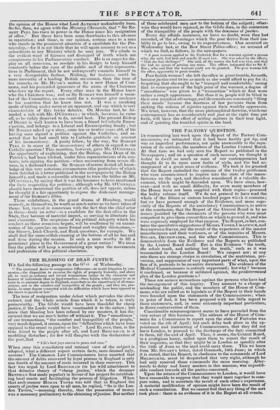" The continual desire to compromise differences—to avoid litigation by
con- cession—the disposition to exercise the rights of property leniently, and above all, to trust ,in ordinary and trivial transactions rather to the character and honour of individuals than to legal remedies—these habits, which appear to us to exist in an eminent degree in England, contribute to the smoothness of all trans- actions, and to the comfort and tranquillity of the people ; and they are, pro- bably, in some degree connected with the difficulties which have been apposed to the resort to justice or law."
The tone of resignation under defeat which pervades the above extract, and the whole article from which it is taken, is truly praiseworthy. The Globe would have been thankful for cheap Justice, if the Lords would have vouchsafed it to the nation ; but since that blessing has been refused by our masters, it has dis- covered that we are much better off without it. The "smoothness" of ourtransactions, "the comfort and tranquillity of the people," very much depend, it seems, upon the "difficulties which have been opposed to the resort to justice or law." Lord EeDoer, then, is the true friend to the people after all, and Lord BROUGHAM is a meddling disturber; for few will disagree with the declaration of the poet, that •
" Life's best joys consist in peace and ease."
When once this consolatory and rational view of the subject is adopted, what a different aspect certain facts, once deemed ugly, assume ! The Common Law Commissioners have asserted that the amount of debts recovered by legal process in England is only one fourth of' the amount of costs incurred in their recovery. This fact was urged by Lord BROUGHAM (in his wild attachment to that delusive theory of "cheap justice," which the dreamer BENTHAM first made popular) in favour of his project for establish- ing local courts and facilitating the process of litigation. • When that arch-sneerer HORNE TOOKE was told that in England the courts of justice were open to all men, he replied, "So is the Lon- don Tavern,"—meaning thereby, that the possession of money was a necessary preliminary to the obtaining ofjustice: But neither of these celebrated men saw to the bottom of the subject; other- wise they Would have rejoiced, as the Globe does, in the connexion of the tranquillity of the people with the dearness of justice.
Every day affords instances, we have no doubt, were they but recorded, of the advantages which the poor derive from their Mae bility to go to law, owing to its expensiveness. One occurred on Wednesday last, at the Bow Street Police-office; an account of which we find, as follows, in the newspapers.
"A poor woman applied to Sir Frederick Roe for a warrant against a person who, she said, had beat and cruelly ill-used her. She was asked by the officer, " Had she four shillings? " She said, all the money she had was two, and that she had no means of getting any more. The officer intimated this to Sir F. Roe; who said that the warrant could not be granted. The poor woman left the office, apparently in great trouble."
Poor foolish woman ! she left the office in great trouble, forsooth, because justice cost twice as much as she could afford to pay for it; forgetting that she ought to be "tranquil and comfortable,' seeing that in consequence of the high price of the warrant, a degree of "smoothness" was given to a "transaction" which at first wore rather a rough appearance. But thus it is, people will be blind to their own manifest advantage, and thousands are constantly "filing their minds" because the dearness of law prevents them from seeking the redress of injuries against their wealthy oppressors. We trust, however, that the more philosophical doctrine, which our contemporary has so considerately and just at the right time put forth, will have the effect of setting matters in their true light, and of quieting the troubled spirits in the laud.


















 Previous page
Previous page